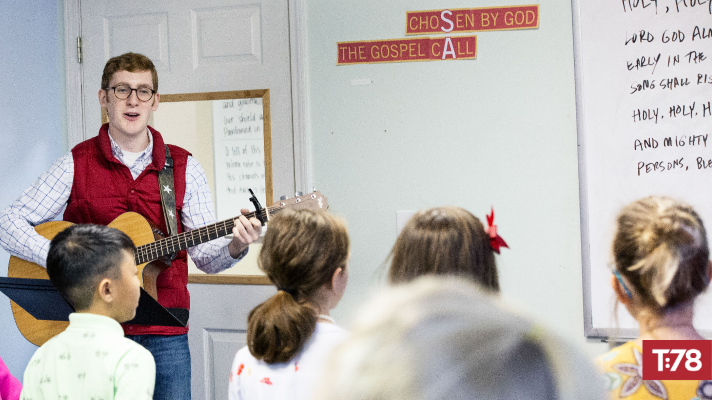For many children, one of their favorite activities of the Sunday school hour is singing. Loud, happy, energetic singing maybe even accompanied by musical instruments, clapping, jumping, and other visibly active expressions. However, as much as I delight in watching a roomful of 6- and 7-years-olds jubilantly sing songs of praise to God in the classroom, I am reminded of these important words from worship leader and song writer Bob Kauflin:
“Worshipping God” means different things at different ages. Younger children, who may not know God yet, may still participate enthusiastically in various external forms of worshipping God. However, we want their worship to be from the heart, and not simply a matter of conforming. They need a clear knowledge of who God is and what He has done. That includes His nature, His attributes, and His works, especially our redemption through Christ. As the Holy Spirit enables them, they will become increasingly aware of their sinfulness before God, accept His gracious gift of forgiveness through the Gospel, and be included among those who will forever be growing in their love for and worship of God. In the mean time, our job is to help them be “dazzled” by the glory of Jesus Christ (quoting Paul Tripp). For one thing that means using more songs that tell us about God than how we feel about Him. ("One More Thought on Training Children to Worship God")
His wise words should serve to undergird our understanding of true worship and direct our preparation and leading of worship in the classroom. Here are at least five implications:
- We must explain to our students the “why” of worship—God is worthy of our greatest love, devotion, trust, affections, honor, and praise.
- We must carefully choose songs that reflect biblical expressions of worship—loud, joyful (not silly or trite), and energetic, but also serious, awe-filled, and reverent. There should be an appropriate balance during the worship time.
- We must always choose songs that reflect biblical truths about the triune God, ourselves, and His work of salvation.
- We must continuously remind our students that true worship of God involves recognizing true things about Him and then having a right, heart-felt response.
- True worship that is pleasing to God can only come from a heart that is trusting in Jesus.
This last point is extremely important to keep in mind when leading children in the worship time. It is fairly simple to encourage children to participate in singing and other outward expressions of praise and doing so is an important part of their biblical education. They are learning the habits and rhythms of the Christian life. But the worship leader should also be imploring, guiding, and encouraging the children toward genuine faith in Christ — making clear that true worship that is acceptable to God can only come about through belief in Christ. We should be aiming and praying that they will, by God’s sovereign grace, be part of the myriads and myriads who will join in everlasting worship of the Lamb (Revelation 5:11).
We have created a training resource for those leading worship time in the classroom. Not only does it give an underlying philosophy of leading children in worship but also provides many practical tips for planning and leading this time.






